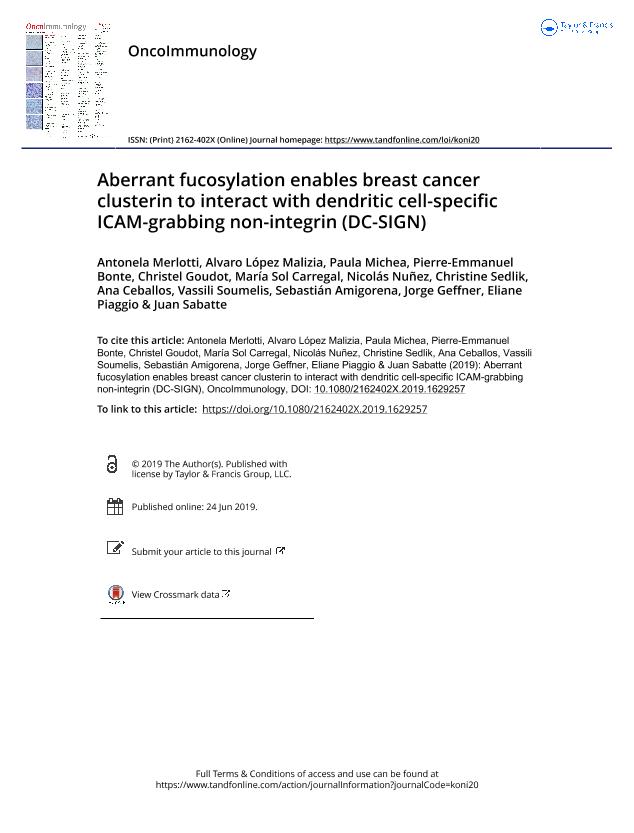Artículo
Aberrant fucosylation enables breast cancer clusterin to interact with dendritic cell-specific ICAM-grabbing non-integrin (DC-SIGN)
Merlotti Ippólito, Antonela ; López Malizia, Álvaro
; López Malizia, Álvaro ; Michea, Paula; Bonte, Pierre Emmanuel; Goudot, Christel; Carregal, María Sol; Nuñez, Nicolás; Sedlik, Christine; Ceballos, Ana
; Michea, Paula; Bonte, Pierre Emmanuel; Goudot, Christel; Carregal, María Sol; Nuñez, Nicolás; Sedlik, Christine; Ceballos, Ana ; Soumelis, Vassili; Amigorena, Sebastián; Geffner, Jorge Raúl
; Soumelis, Vassili; Amigorena, Sebastián; Geffner, Jorge Raúl ; Piaggio, Eliane; Sabatte, Juan Atilio
; Piaggio, Eliane; Sabatte, Juan Atilio
 ; López Malizia, Álvaro
; López Malizia, Álvaro ; Michea, Paula; Bonte, Pierre Emmanuel; Goudot, Christel; Carregal, María Sol; Nuñez, Nicolás; Sedlik, Christine; Ceballos, Ana
; Michea, Paula; Bonte, Pierre Emmanuel; Goudot, Christel; Carregal, María Sol; Nuñez, Nicolás; Sedlik, Christine; Ceballos, Ana ; Soumelis, Vassili; Amigorena, Sebastián; Geffner, Jorge Raúl
; Soumelis, Vassili; Amigorena, Sebastián; Geffner, Jorge Raúl ; Piaggio, Eliane; Sabatte, Juan Atilio
; Piaggio, Eliane; Sabatte, Juan Atilio
Fecha de publicación:
24/09/2019
Editorial:
Taylor & Francis
Revista:
OncoImmunology
ISSN:
2162-402X
Idioma:
Inglés
Tipo de recurso:
Artículo publicado
Clasificación temática:
Resumen
Clusterin is a glycoprotein able to mediate different physiological functions such as control of complement activation, promotion of unfolded protein clearance and modulation of cell survival. Clusterin is overexpressed in many types of cancers and a large body of evidence suggests that it promotes carcinogenesis and tumor progression. We have previously described a novel clusterin glycoform present in human semen, but not in serum, highly enriched in terminal fucose motifs. Here we show that human luminal breast cancer (LBC) clusterin also bears terminal fucosylated glycans, conferring clusterin the ability to interact with DC-SIGN, a C-type lectin receptor expressed by myeloid cells. This clusterin glycosylation pattern was absent or diminished in non-involved juxtatumoral tissue, suggesting that fucosylated clusterin might represent a cancer associated glycoform. We also found that DC-SIGN is expressed by luminal breast cancer intratumoral macrophages. Moreover, experiments performed in vitro using semen fucosylated clusterin and monocyte derived macrophages showed that the interaction of semen clusterin with DC-SIGN promoted a proangiogenic profile, characterized by a high production of VEGF, IL-8 and TNF-α. Our results reveal an unexpected complexity on the structure and function of secretory clusterin produced by tumors and suggest that fucosylated clusterin produced by luminal breast cancer cells might play a role in tumor progression by promoting the release of pro-angiogenic factors by intratumoral macrophages.
Palabras clave:
BREAST CANCER
,
CLUSTERIN
,
DC-SIGN
,
FUCOSYLATION
,
MACROPHAGES
Archivos asociados
Licencia
Identificadores
Colecciones
Articulos(INBIRS)
Articulos de INSTITUTO DE INVESTIGACIONES BIOMEDICAS EN RETROVIRUS Y SIDA
Articulos de INSTITUTO DE INVESTIGACIONES BIOMEDICAS EN RETROVIRUS Y SIDA
Citación
Merlotti Ippólito, Antonela; López Malizia, Álvaro; Michea, Paula; Bonte, Pierre Emmanuel; Goudot, Christel; et al.; Aberrant fucosylation enables breast cancer clusterin to interact with dendritic cell-specific ICAM-grabbing non-integrin (DC-SIGN); Taylor & Francis; OncoImmunology; 8; 9; 24-9-2019; 1-11
Compartir
Altmétricas



